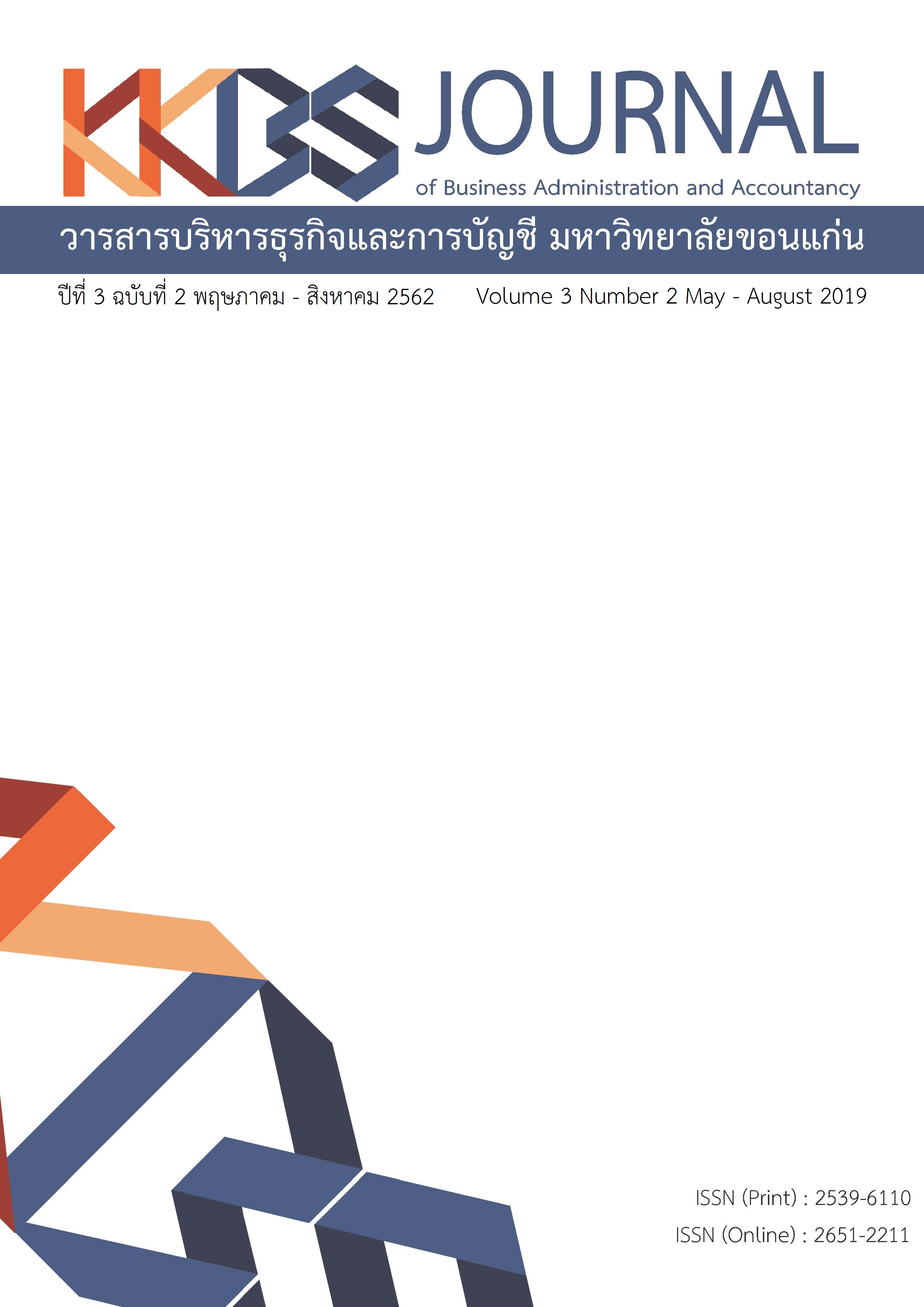The Relationship between Audit Industry Specialization and Audit Quality of Complex and Non-Complex Industries: Case Study of Listed Company in the Stock Exchange of Thailand
Main Article Content
Abstract
This research provides different empirical evidence from prior study. The research objective is to investigate of the relationship between audit industry specialization and audit quality. The data were gathered from 549 listed companies for the fiscal year 2017, and then analyzed using multiple regression analysis. The results find that there is positive relation between audit industry specialization and audit quality with non-complex industry samples. However, focusing on complex industry samples, the study finds that audit industry specialization and audit quality are not positive relationship. This study points out that premium audit fee in each audit firm charge to listed companies increase marketing share in audit market. On the other hand, auditors may actually not be “industry specialists” in Thailand context because audit industry specialization do not impact audit quality with complex industry samples. Consequently, declaration of audit firm whether the “audit industry specialization” definition may not be reasonable in Thailand context.
Article Details
The articles published in the journals are the authors' opinions, not the opinion of the editorial team or administrative staff. The articles published is copyright of the Journal of Business Administration and Accounting, Khon Kaen University.
References
Black, K. (2006). Business statistics for contemporary decision making. 4th ed. New York: Wiley.
Brown, V.L. (2016). Audit quality indicators: Perceptions of junior-level auditors. Managerial Auditing Journal, 31(8/9), 949-980
Bushman, R.M., Piotroski, J.D. & Smith, A.J. (2004). What determines corporate transparency? Journal of Accounting Research, 42(2), 207-252.
Butar-Butar, S. & Indarto, S.L.I.L. (2018). Does auditor industry expertise improve audit quality in complex business environments? Jurnal Akuntansi dan Keuangan, 20(1), 1-12.
Cahan, S.F., Jeter, D.C. & Naiker, V. (2011). Are all industry specialist auditors the same? Auditing: A Journal of practice & Theory, 30(4), 191- 222.
Choi, J.H., Kim, C., Kim, J.B. & Zang, Y. (2010). Audit office size, audit quality, and audit pricing. Auditing: A Journal of Practice & Theory, 29(1), 73-97.
Cohen, J., Krishnamoorthy, G. & Wright, A. (2010). Corporate governance in the post‐Sarbanes-Oxley era: Auditors’ experiences. Contemporary Accounting Research, 27(3), 751-786.
Creswell, (2009). The application of mixed methods designs to trauma research. Journal of Traumatic Stress, 22(6), 612-621.
DeAngelo, L.E. (1981). Auditor size and audit quality. Journal of Accounting and Economics, 3(3), 183-199.
Dechow, P.M., Sloan, R.G. & Sweeney, A.P. (1995). Detecting earnings management. Accounting Review, 70(2), 193-225.
Dunn, K.A. & Mayhew, B.W. (2004). Audit firm industry specialization and client disclosure quality. Review of Accounting Studies, 9(1), 35-58.
Francis, J.R. & Gunn, J.L. (2015). Industry accounting complexity and earnings properties: Does auditor industry expertise matters? Missouri: University of Missouri and the University of Pittsburgh.
Givoly, D., Hayn, C. & D'souza, J. (1999). Measurement errors and information content of segment reporting. Review of Accounting Studies, 4(1), 15-43.
Hair, J.F., Black, W.C., Babin, B.J. & Anderson, R.E. (2010). Multivariate data analysis. 7th ed. Upper Saddle River, N.J.: Prentice Hall.
Herusetya, A. (2009). Pengaruh Ukuran Auditor dan Spesialisasi Auditor Terhadap Kualitas Laba. Jurnal Akuntansi dan Keuangan Indonesia, 6(1), 46-70.
Jones, J.J. (1991). Earnings management during import relief investigations. Journal of Accounting Research, 29(2), 193-228.
Junhom, S. (2011). Earning quality of family-owned and managed firms. Master of Accounting, Thammasat University. (In Thai)
Krishnan, G. (2003). Audit quality and the pricing of discretionary accruals. Journal of Practice and Theory, 22(1), 109-126.
Khurana, I.K. & Raman, K.K. (2004). Litigation risk and the financial reporting credibility of Big4 versus Non-Big4 audits: Evidence from Anglo-American countries. The Accounting Review, 79(2), 473-495.
Liu, J.H. (2007). On determinants of audit fee: New evidence from China. Journal of Modern Accounting and Auditing, 3(4), 60-64.
McKee, T.E. (2005). Earnings management: An executive perspective. Singapore: Cengage Learning.
Sarwoko, I. & Agoes, S. (2014). An empirical analysis of auditor's industry specialization, auditor's independence and audit procedures on audit quality: evidence from Indonesia. Procedia-Social and Behavioral Sciences, 164, 271-281.
Setiawan, L. & Fitriany, F. (2011). Pengaruh workload dan spesialisasi auditor terhadap kualitas audit dengan kualitas komite audit sebagai variable pemoderasi. Jurnal Akuntansi Dan Keuangan Indonesia, 8(1), 36-53.
Wongsrila, R. (2017). Effects of auditing competency on financial statement quality of tax auditors in Bangkok. Master of Accountancy School of Accountancy, Sripatum University. (In Thai)
Youngmanee, S. (2015). Factors affecting on volume and audit quality of Thailand auditors. Master of Business Administration, Rajamangala University of Technology Phra Nakhon. (In Thai)


